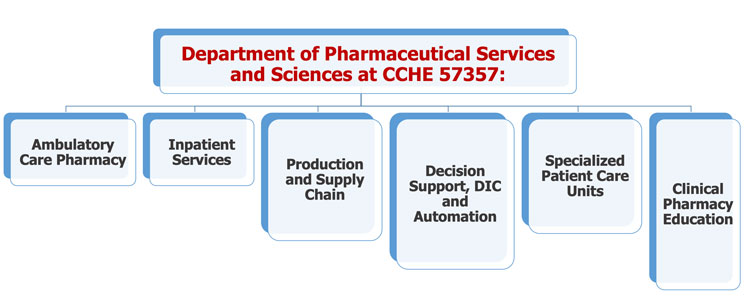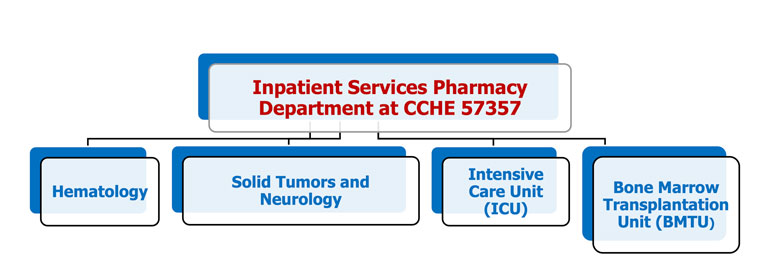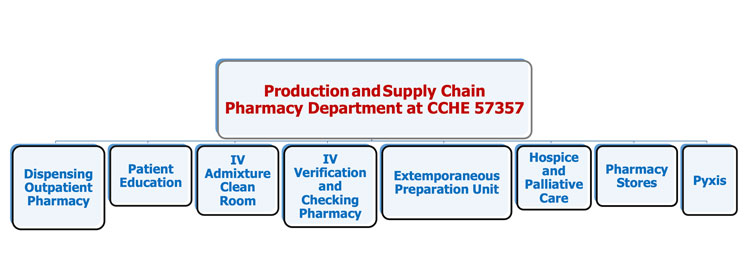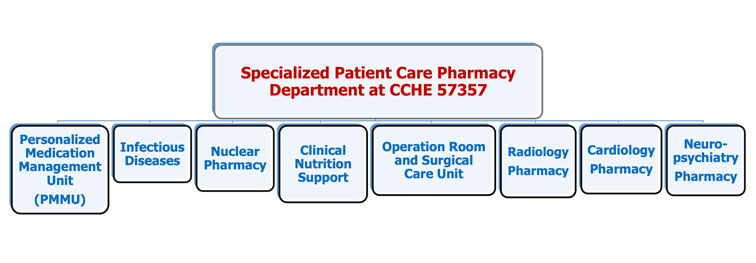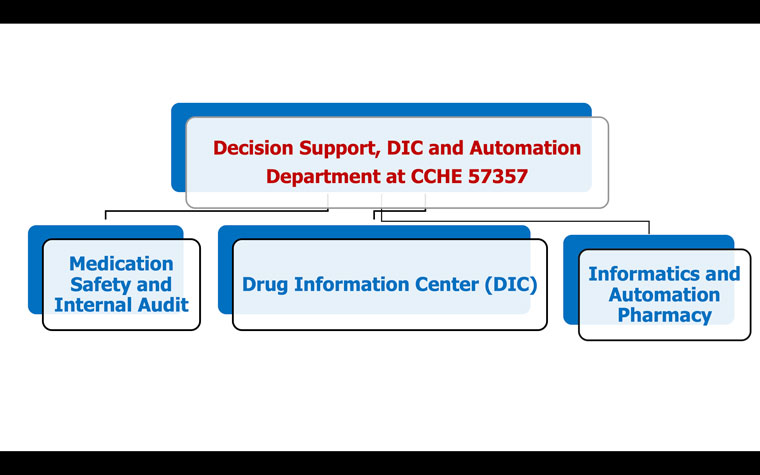Pharmaceutical Services & Sciences
- 19057
- (202) 25351500, Ext.4165
- [email protected]

Overview
Overview
Department of Pharmaceutical Services and Sciences at CCHE 57357:
- Our collaborative approach ensures that all our patients receive the best comprehensive clinical care from a team of pharmacy specialists spanning specific pharmaceutical and clinical subspecialties.
- The department has been fully automated since November 2009. Our strategy is to provide the hospital with a cost-effective state of all pharmaceutical services.
- We work 24 hours a day, 365 days a year, to optimize, compound, dispense, and monitor every one of the millions of medication doses prepared by the pharmacy each year.
Clinical Pharmacist Scope of Services
- Safe and Effective Medication Use
Pharmacists will take clinical action and make evidence-based recommendations to ensure the safe and effective use of medications to meet therapeutic goals.
- Evaluation of Patient Profile and Medication Orders
- A pharmacist reviews the appropriateness of medication orders for dispensing medications in the hospital.
- Each order will be evaluated for appropriateness before the first dose being dispensed (except in emergencies or in those instances where a medication is administered under the direct supervision of a physician)
- Order verification in a timely manner: For priority medications, verification within 15 minutes of receiving the order, for non-urgent medications, verification within 60 minutes of receiving the order
- Evaluation of Patient Profile and Medication Orders
Patient profile review upon order verification and continuously based upon team and patient acuity, Known drug allergies, and review of medication list for:
- Drug-drug interactions
- Drug-disease interactions
- Duplicate or missing medications
- Appropriate lab orders
- Cost-effective therapy
- Assessment of therapeutic appropriateness:
- Indication
- Route and method of administration
- Anticipated toxicity or adverse effects
- Assessment of renal dosing upon order verification and profile review
- Therapeutic drug monitoring and ordering of associated laboratory procedures as indicated
- Daily antibiotic stewardship efforts require indication and duration of therapy for each antibiotic ordered and to enforce current antimicrobial formulary restrictions and practice guidelines.
- Ensure appropriate compliance with risk evaluation and mitigation strategy medications.
- Support distribution needs to patient care areas by coordinating with central pharmacy staff.
- Direct pharmacy technicians and interns in their daily work by observing their performance, giving timely feedback, answering questions, providing guidance, and checking the accuracy of their work
- Pharmacist Medication Dosing Services
Pharmacists are responsible for the pharmacy consultation services.
- Medication Histories and Reconciliation
Pharmacists are accountable for the following:
- Obtain medication histories within 24 hours of patient admission
- Complete admission medication reconciliation within 24 hours of patient admission
- Complete transfer medication reconciliation with each level of service transfer and with transfer out of the operating room
- Review and verification of medications ordered more than 27 days ago.
- Discharge Reconciliation and Coordination
- Pharmacists are held accountable for the following:
- To complete discharge medication reconciliation before patient discharge
- To Complete discharge medication counseling to the patient before discharge
- To Facilitate access to outpatient prescriptions before discharge as appropriate
- A primary focus for pharmacists daily includes:
- Provision of consultations in a timely and accurate manner to support other health professionals regarding medication therapy selection and management
- Provision of disease state and medication-specific education during hospitalization
- Pharmacists are held accountable for the following:
- Discharge Reconciliation and Coordination
- Multidisciplinary Team Involvement
To better integrate into the medical team, pharmacists:
- Attend daily care coordination rounds to facilitate discharge medication needs
- Support and augment patient care rounds
- Pharmacists document notes and care plans are logged in the electronic medical record as appropriate.
- Communication between Pharmacists
To ensure proper care of patients through shift changes and transfers, pharmacists are to:
- Proactively identify hand-off needs before the end of shifts and coordinate key hand-offs in the sign-out notes
- Contact receiving pharmacy team members when appropriate regarding patient transfers from unit to unit to ensure continuity of care.
- Precepting and Teaching
As part of an academic medical center, pharmacist duties include the following:
- Daily teaching and incorporation of evidence-based learning into resident and student rotations
- Evaluation and feedback for residents and students regularly
- Timely coordination of rotation activities
- Effective use of residents, students, and interns as pharmacist extenders
- Formulary Management
Pharmacists assess the following during their daily duties:
- Approved use and indication of formulary or restricted agents
- Compliance and support of evidence-based guidelines and medication use policies
- Approved therapeutic interchanges for medications at order verification o Assessment and prospective planning of switching patients from IV to PO regimens when able
- Completion of non-formulary request process
- Supply documentation to healthcare providers regarding medication use and patient outcomes from medication therapy
- Participate and provide input in developing and applying policies, procedures, clinical care plans, guidelines, order sets, interdisciplinary standards of care, and protocols involving medication use.
- Verify the validity of off-label medication use with primary, secondary, and tertiary medication references.
- Emergency Management
Pharmacists support and participate in emergency management:
- ICU or Emergency Department pharmacists respond to all Code 4 emergencies
- Pharmacists will respond to all rapid responses in their assigned area
- Timely response to an emergency or disaster management process
- Support rapid sequence intubation and conscious sedation
- Quality and Process Improvement
Pharmacists are actively engaged in quality and process improvement:
- Represent the Pharmacy Department on committees, task forces, workgroups, and unit-based councils that make decisions concerning medication use or engage in improvement initiatives that support patient-focused care
- Lead and support medication use related to achieving outcomes around quality measures (national patient safety goals, core measures, value-based purchasing)
- Active and timely participation and support of multidisciplinary process improvement
- Actively participate in business process committees throughout the hospital
- In Egypt, clinical pharmacy education was initiated at the Faculty of Pharmacy, Tanta University, as early as 1980 by visiting US professors.
- In 1994, the Faculty of Pharmacy Ain-Shams University was established, following the foundation set by Tanta University and incorporating clinical pharmacy curricula into its courses (Anowr, 2010).
- In 1997, a fundamental shift occurred in the clinical pharmacy practice when the National Cancer Institute (NCI) established the first Clinical Pharmacy Unit by Dr. Sherif Abouelnaga.
- The experience was shared, and more hospitals and medical centers started setting up clinical pharmacy units.
- In 2007, the Department of Pharmaceutical Services and Sciences (DPS), Children's Cancer Hospital Egypt 57357 (CCHE), started its operation, building upon NCI's experience (Anor, 2011).
- The International Pharmacy Practice Residency (IPPR) Program, accredited by the American Society of Health-System Pharmacists, is considerably new in Africa.
- The first IPPR program was initiated in Egypt in 2017 by Children’s Cancer Hospital Egypt 57357.
History
History of Clinical Pharmacy in Egypt:
Anor, W. M. E. I. (2011). History of Clinical Pharmacy Practice in Egypt ( Part 2 ) Children 's Cancer Hospital Egypt ‐ 57357. 2(2), 61–63.
Anowr, M. El. (2010). Clinical Pharmacy in Egypt Part ( I ) Development of the teaching curricula of clinical Pharmacy in Universities of Egypt Pioneer. International Journal of Pharmacy Teaching & Practices, 1(2), 18–19.

- 2007 Specialities:
- Automated dispensing devices inpatient
- Critical Care
- Day Care
- Dispensing Pharmacy
- Inpatient
- IV Clean Room
- Patient Education
- PK Lab
- Store
- 2009 Specialities:
- Pharmacy Information System
- 2010 Specialities:
- Clinical Pharmacy Education
- MSC
- 2012 Specialities:
- OR Pharmacist
- 2013 Specialities:
- Pain & Pallative
- 2014 Specialities:
- ER
- Internal Audit
- 2015 Specialities:
- DIC
- 2016 Specialities:
- Nuclear Pharmacy
- Radiology Pharmacy
- 2017 Specialities:
- Nutrition support services
- Perceptorship program
- Residency program
- 2018 Specialities:
- Extemporanous preparation
- Infecious disease
- Mentorship program
- PGx
- Stewardship program
- 2019 Specialities:
- Cardiology
- QC Lab
- TPN Room
Department Evolution through the Years:

Statistics
Number of Total Prepared Doses at Department of Pharmaceutical Services and Sciences at CCHE 57357 per Year:

Number of Total Prepared Doses at Department of Pharmaceutical Services and Sciences at CCHE 57357 per Year:

Total Number of Prepared Oral Doses at Department of Pharmaceutical Services and Sciences at CCHE 57357 per Year:

Structure
Department of Pharmaceutical Services and Sciences at CCHE 57357:
Ambulatory Care Pharmacy Department at CCHE 57357:
Inpatient Services Pharmacy Department at CCHE 57357:
Production and Supply Chain Pharmacy Department at CCHE 57357:
Specialized Patient Care Pharmacy Department at CCHE 57357:
Decision Support, DIC, and Automation Department at CCHE 57357:
- Overview
- Specialized Patient Care Department
- Inpatient Services Department
- Clinical Pharmacy Education Unit
- Production & Supply Chain Dep.
- Ambulatory Care Department
- Decision Support Department
- Meet Our Team
- Achievements
- Publications
- Latest Technologies
- Photo Gallery
- Video Library
- Join Our Team
- Training Request
- To Apply for Residency Program

